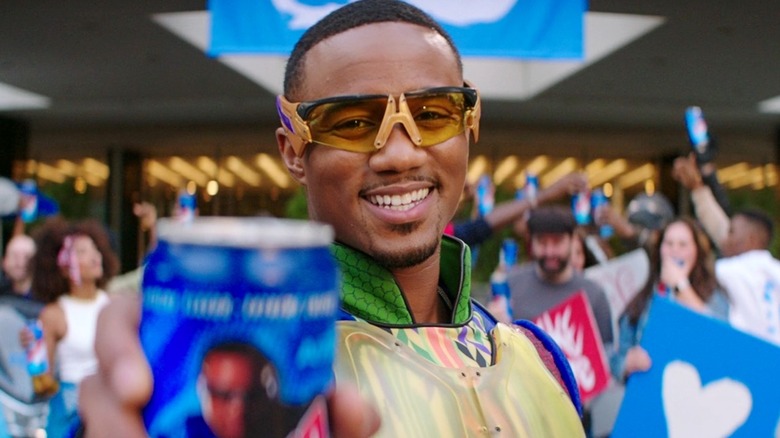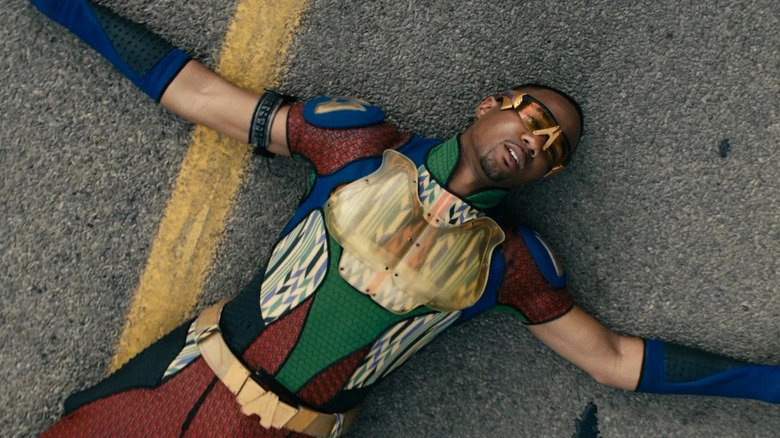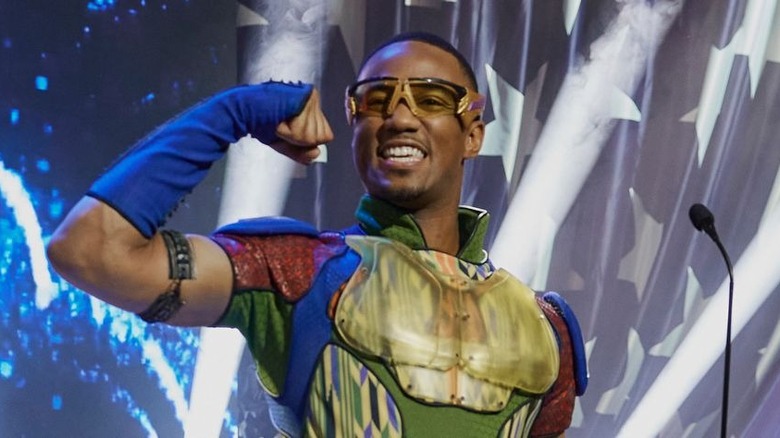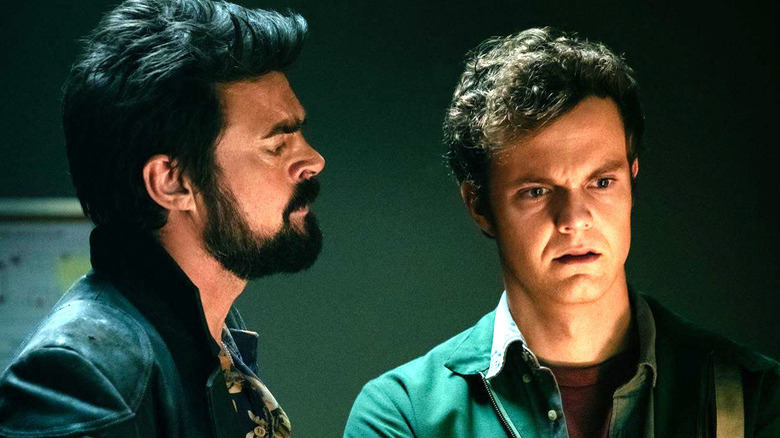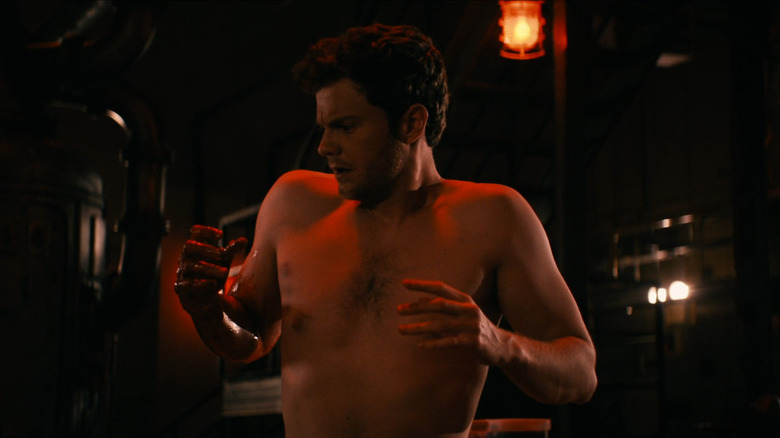Why A-Train's 'Cure' Is The Heart Of The Boys Season 3
When "The Boys" premiered, it seemed like just another nihilistic, gross, gory look at superheroes, where hope doesn't exist and depravity is the word of the day. It became clear rather quickly, though, that the show was actually hiding some satisfyingly sharp satire. Sure, there is over-the-top gore and action, and yes the series is incredibly gross and upsetting at times, and it's also definitely still rather dark. But now the show finds hope, even in its nihilism.
In its third season, "The Boys" has become one of the most poignant satires on TV: upping the stakes, the comedy and also the depravity, opening with one of the grossest scenes of the year, doing an episode that traumatized the whole cast and crew, and featuring one of the most shocking superhero fights in a long while.
But while its flashiest satires are those of politicians or superheroes as police, "The Boys" season 3 has also quietly delivered one of its sharpest pieces of commentary on the state of superhero stories and the genre ideology that powers can be good when in the hands of good people — and it is doing so through A-Train's storyline.
Heavy spoilers for "The Boys" season 3, episode 7.
Running in place
Though Homelander certainly took the spotlight, A-Train was the original villain of "The Boys." He was the catalyst that led Hughie down the path to vigilantism after A-Train killed Hughie's girlfriend by literally running straight through her — something he'd apparently done several times before.
Though he never really cared about his actions, things changed this year for A-Train. Suffering from a heart condition that makes him unable to use his super speed, he attempted to secure his place on the Seven by highlighting his publicity value as the only (unmasked) African American member of the team. When pressured by his brother, Nathan, A-Train even tried to use his position at Vought to hold fellow superhero Blue Hawk accountable for police brutality in Black neighborhoods. Of course, despite his good intentions, A-Train was still going at it the wrong way — not using his status as a hero to do good in his community, but doing good in the community to get back his status as a hero — and Blue Hawk ended his "apology" by leaving Nathan paralyzed.
Thirsty for vengeance, A-Train found Blue Hawk at "Herogasm" and executed him by dragging his body through the concrete at super-speed (a parallel to the 1998 murder of James Byrd Jr., who was dragged for three miles behind a pickup truck). The use of his powers finally caused A-Train to collapse on the street from heart failure.
Except that was not the end of him! Because in the latest episode we find out A-Train actually survived — thanks to Blue Hawk's heart, which now resides inside the speedster.
Crime and punishment
This is the beauty of "The Boys:" that it doesn't matter who you are, or what you do, the bill is eventually going to come due. When we spoke to Karl Urban about Butcher developing powers ahead of the season premiere, he said that in the world of the show "when [characters] make the wrong choice, they get punished."
What makes A-Train's story so entertaining and fascinating this season is that it started out of him being so desperate to get back to the spotlight that he (albeit cynically) tried to be a representative for the Black community. His attempts to get Blue Hawk to face consequences for his bigotry came out of a sincere place, if for the wrong reasons. After his efforts led to his brother being paralyzed, A-Train finally felt what it was like to be on the other side of superhero violence, which leads to the shocking moment in "Herogasm" where A-Train finally apologizes to Hughie for killing his girlfriend — and it seems like he actually means it.
If we follow Karl Urban's quote about the way showrunner Eric Kripke thinks, A-Train did something good by apologizing (and ridding the world of Blue Hawk), which leads to him surviving his ordeal and finally getting a healthy heart that can sustain his powers. Yet he still did horrible things unapologetically for years, and he's still clinging to the power and status of his place among the Seven. So while his wish to be "the fastest man alive" again is granted, it's also corrupted; the heart that saves him comes from the racist pig that paralyzed his brother.
Hey, at least he's getting a biopic about his life starring Tom Hanks ... but it's a white-washed Oscar bait film about a white trainer picking a kid from the slums and teaching him to be "civilized."
What about the Boys?
A-Train's powers come at a price. He will never be able to sincerely stand up to the ideals he preaches, as he owes those powers (and his life) to a horrible bigot and a fundamentally evil corporation. He got everything he's wanted since the start of the season, but he got it in ways that expose just how shallow his intentions really were.
Now, what does that mean for our boys? Hughie and Butcher are also doing something good in fighting Homelander, but they are becoming the very thing they want to destroy by using superpowers that can do a lot of damage. Since the very beginning, "The Boys" has argued that superpowers are bad no matter who has them — that simply having powers greater than a normal person brings out the worst in people, so it's better to not have them at all. Butcher has lost sight of that, and he and Hughie are now buying into the mainstream superhero ideology that superpowers are good if they are being used for good.
Thankfully, "The Boys" season 3 is proving them wrong. As Urban said, actions have consequences, and we're seeing in real-time how using Temp V to fight Homelander is costing the two dearly — first with Butcher leaking some strange liquid out of his ears and, after this last episode, with Starlight revealing that test subjects always died after a few days. Butcher and Hughie are at the same point A-Train was at the start of the show: addicted to the powerful benefits of Compound V, but blinded to both the collateral damage and the impact on their own health. The bill will come due.
No good heroes
It is telling that the only person with powers on "The Boys" who is actually doing any good — the only person that might justify Butcher's actions — is Annie January (formerly known as Starlight), and she has renounced her superpowers and hero identity.
This is what separates "The Boys" from our current superhero giants, Marvel and DC. The show is actually following through with the idea that no one should have these superpowers, not even the "good guys." The DCEU and the MCU did attempt to grapple with this idea in "Batman V Superman: Dawn of Justice" and "Captain America: Civil War;" both movies toyed with the question of whether unchecked power is bad, with Superman being investigated by Congress and the Avengers facing government regulation.
The problem, of course, is that these were still mainstream superhero movies, trapped within the confines of ongoing franchises, so there were zero repercussions. There's no real option to conclude that superpowers are bad when your brand depends on them (the post-credits scenes for "Civil War" were teasers for "Black Panther" and "Spider-Man: Homecoming"). Indeed, the solution to the dilemma in both movies is just letting the heroes keep their powers and carry on because there are bad people that need to be punched in the face and they are our best shot.
"The Boys" is showing us that it doesn't have to be that way; when you set out to satirize and challenge the genre's conventions, you can actually have consequences in your superhero stories. We'll find out what those consequences are for Hughie and Butcher soon enough.
"The Boys" is streaming on Prime Video, with new episodes premiering Fridays.
